Negro Hymnology
by W. A. Barrett
The Musical Times and Singing Class Circular, Vol. 15, No. 354 (Aug. 1, 1872), pp. 559-561
[This is one of the early articles with music (although the scans weren't good- you can still read the melody) covering African-American hymns and singing. There's a quote from New York Nation of May 30, 1867 describing an African-American "shout."
Edited one time- bound to be some small mistakes- R.Matteson 2011]
THE MUSICAL TIMES,
And Singing Class Circular
AUGUST 1, 1872
NEGRO HYMNOLOGY
Is it possible to say where the sublime ends and the ricliculous begins? Are there any rules or tests of sufficiently general application to fix definitely and at once, the point or points of junction or departure between pathos and bathos? To determine where the practical finishes, and the speculative commences, Or is it that the serious is so interwoven with the humorous, that it is absolately impossible to account satisfactorily ir the truth, that men at one time laugh at that which at another time excites their most serious thoughts otherlvise it is difficult to understand the reason d'etre of parodies, comic poems, satires, and burlesque, the keenest and most pointed being those levelled at the gravest affairs of life.
A difference of position, education and tastes has to be taken into consideration in the pursuit of such an enquiry, as it is only amongst the more refined and polished peoples, that subtle distinctions are maintained and kept apart in language and literature; for the lower the scale socially or ethnologically, the greater are the inconsistencies in speech and song; sentences, images and sentences crowded together in free antithesis less with the object of exciting wonder and amusement, than with the desire to carry the mind captive by the use of phraseology intended to be thrilling and fine. These peculiarities are probably the earliest signs of poetical development, for incongruities and inconsistencies are characteristic of the popular poems in all European countries, whether new or old, and it is yet a question whether the confuszon of images may not serve as tests of the age of poetry among civilised peoples.
Rhyming is a lower faculty than reasoning, and most minds are more prone to rhythm than to rhapsody, and so it is easy to understand why uneducated people above a ballad a life," and fail to be sensible to the charms of "your new-fangled tarradiddles," as poetical fervour is irreverently called, because a ballad is the simple narration of plain facts in a rhymed or rhythmical form, without gloss or comment of a poetical nature, and with no reflections suggested by the themes other than the moral tacked on to the end. Pious, ejaculations were the first forms of these reflections- morals properly so called, being later additions. Thus, in the ballad of 'Flodden feilde," written about the year 1544, the last verse runs:-
"Now God that was in Bethlem borne
And for us dyed upon a tree
Save our noble prince that wereth the crowne
And have mercy on the Erles soule of Derbye.
And in the ballad of the "Pore man and the kynge" (about 1673) the moral is thus expressed:-
"God send all lawyers thus well served,
Then may pore farmers live in rest -
God blesse and save our noble kinge
And send us to live in peace."
The final verse of the "Drunkard's Legacy," written in the early part of the 17th century:
"Let all young men now, for my sake
Take eare how they such havoc make -
For drunkenness you plain may see
Had like his ruin for to be."
- also contains the only reflection upon the incidents told in the body of the ballad.
To these might be added nulnerous other quotations all tending to prove that the popular mind is less willing than incapable, of appreciating reflective poetry and the later the date, the more reasoning and reasonabie are the ideas suggested by the subject. But the expansion of fanciful ideas is not neceseary to make a ballad acceptable, all that is needful being a plain story told in fit language in a rhyme and measure that may be readily remembered. This being true of the memories and fancies of the partly informed, it is still more foreibly true of the wholly uneducated. Take for example the secular songs of the negro population of America and m putting them to the test of an examination it is found that rhythmical cadences,-evell if gained by repetition of words, and a rhyme added,-though that rhyme has little or no connection with the story or sense of the song-form a combination that is at once a passport to favour and popularity, as well with the people among whom they originate, as with the easily pleased among the more enlightened. A verse of Ole Zip Coon, "a genuine; negro song," will fully illustrate these remarks, as it contains all the characteristics indicated, sense being sacrificed to rhyme, and rhythm gained by repetition, while the absurdity of the consequent following upon the antecedent, is not the least remarkable portion of its humour.
"I went down Sandy Hollow t'other afternoon (repeated three times.)
And who should I meet hut ole Zip Coon.
Ole Zip Coon were a mighty fine scholar, (three times again)
If he hit a feller once, why, he make a fellow holler."
A striking proof of a muscular mind, cappable of readilv demonstrating to the shortest and most complete method the results and advantages of a peculiar training. The specialities observed in this example have their counterparts in the hymns or verses sung at the camp meetings, prayer shouts, and semi-private gatherings of the coloured people, when the solemnity of the subiects, treated in quaint and homely language or couched in high sounding if not pertinent diction, kindle feelings in the minds of disinterested observers somewhat foreign to those intended tobe awakened.
And yet many of these "sperichils" as they are called, have been adopted by white congregations and when sung with zest and spirit, swaying of bodies, nodding of heads, and rhythmical moving of the hands, produce almost indescribable results. Judging by the effects of these perishable, because oral, effusions many enthusiastic persons have endeavoured to transcribe them upon papar for the benefit of those who would be interested to know of their existence, but being placed at too great a distance, can never have personal experience of them.
The few extracts from these collections, which can be comprised within the limits of the present paper, offer curious subjects for study and thought, and will amply illustrate the difficulty of dissociating the pathetic from the humorous especially in such productions where literary merit is a secondary consideration, if any at all, compared with the object gained by an unusual juxtaposition of words.
The "verses" are variable, changing with the whim of the singers or yielding to temporary circumstances: the leader starts the words of each verse, often improvising, and the ohers, who "base" him, as it is called, strike in with the refrains or even join in the solo, when the words are familiar. When the "base"begins, the leader often stops 'leaving the rest of his words to be guessed at, or it may be they are taken up by the other eingers. And the "basers" themselves seem to follow their own whims, beginning when they please and leaving of when they please, striking an octave above or below (in case they have pitched the line too low or too high), or singing some other note that accords, so as to produce the effect of a marvellous complication and variety, and yet with the most perfect time, and rarely with any discord.
The voices of the coloured people have a peculiar quality that nothing can imitate, and the delicate variations of melody, being often in a scale for which we have no adequate notation make the nature and character of the written tunes only approximate and suggestive, and therefore the melodies quoted here can only be said to be mere representations rather than reproductions. In many of these tunes there is a sweetness, freshness and daring construction not to be found in melodies made by measure, and the untutored musicians have in more than one instance succeeded in producing themes which for boldness and originality cannot fail to be very striking.
It must be distinctly understood that these verses, which to the better informed mind appear ridiculous and irreverent are not so to the poor people who sing them. but are earnest truths, and convey to the minds of the singers often the most acceptable form of doctrine, and reminiscences of Scripture history, while the outward observer who looks deeper for some meaning below that which appears on the surface, and casts aside the tangle of strange subjects with which the real substance is intermingled, will find unmistakable evidences of a child-like faith, an almost unreasoning trust, in the homely and familiar use of sacred images, that speak most forcibly and earnestly of the deep, true and tender religious fervour of the feelings and sentiments of these people.
The hymn called "Da new Jerusalem," though at first sight merely humorous, is not really so, and the thrilling effect of a body of voices singing with heart and soul the tune and the words may be well imagined, when the full sense of the quaint melody is comprehended.
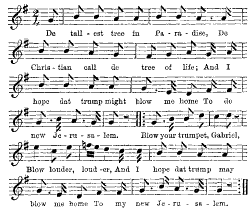
NEW JERUSALEM
De tall - est tree in Pa - ra, - dise,
De Chris- tian call de tree of life;
And I hope dat trump might blow me home
To de new Je-ru - sa- lem.
Blow your trumpet, Gabriel,
Blow louder, loud -er,
And I hope dat trump may blow me horne
To my new Je - ru - sa - lem.
Colonel Higginson, one of the most assiduous collectors of these songs and "spirichels," describes his meeting with the author of some of these things, and repeats the words of that author in explaining their rise and origin. "I always wondered," he says, "whether they had always a conscious and definite origin in some leading mirld, or whether they grew by gradual a ccretion, in an almost unconscious way. On this point I could get no information, though I asked many questions, until at last, one day when I was being rowed across from Beaufort to Ladies' Island, I found myself with delight on the actual trail of a song. One of the oarsmen, a brisk young fellow, not a soldier, on being asked for his theory on the matter, dropped out a coy confession.
"Some good spirichels" he said, "are jest start out o' curiosity. I been a-raise song, myself, once."
"My dream was fulfilled and I had traced out, not the poem alone, but the poet. I implored him to proceed.
"Once we boys," he said, "went for tote some rice, and de nigger driver he keep a callin' on us; and I say 'O' de ole nigger driver!" Den anudder said "Fust ting my mammy told me was, notin' so bad as nigger drivers! "Den I made a sing, just puttin' a word, den anudder word."
"Then he began singing, and the men, after listening a moment, joined in the chorus as if it were an old acquaintance, though they evidantly had never heard it before. I saw how easily a new 'sing' took root among them. The negroes have no part-singing, they deliver these melodies with only an occasional chord or notes in harmony. Their songs and hymns are sung in varying times according to the disposition of the singers, or the words in which they are engaged.
"As the same songs," writes Miss McKim, "are sung at every sort of work, of course the tempo is not always alike. On the water, the oars dip 'Poor Rosy' to an even andante - a stout boy and girl at the hominy mill will make the same 'Poor Rosy' fly, to keep time with the whirling stone and in the evening, after the day's work is done, "Heaven shall a be my home," peals up slowly and mournfully from the distant quarters. One woman, a respectable house servant, who had lost all but one of her twenty-two children, said to me, "Pshaw! don't har to dese yer chil'en, missee. Dey jest rattles it of dey don't knon how for sing it. I likes 'Poor Rosy, better dan all de songs, but it can't be sung widout a full heart and a troubled sperrit!' "
The plaintive beauty of the melody and the touching pathos of the words, will be but aeen in the quotation subjoined:
"POOR ROSY"
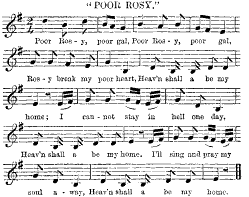
Poor Rosy, poor gal, Poor Rosy, poor gal,
Ros-y break my poor heart Heaven shall be home;
I can - not stay in hell one day,
Heav'n shall a be my home.
I'll sing and pray my soul away,
Heav'n shall a be my home.
2. Got hard trial in my way (three times)
Heav'n shall a be my home
O when I talk I talk wid God
Heav'n shall a be my home.
3. I dunno what de people want of me,
Heav'n shall be my home
My life is hardt my prayers is loud
Heav'n shall a be my home.
The keen percoption of religious sentiment shown in many of the songs, is equalled by the expressions of morality with which they abound, and if they are not remarkable for the refinement of the language in which they are inculcated, no one can complain of their vigour. Take for example the first verse of "I saw the beam"
"I saw the beam in my sister's eye
Can't saw de beam in mine
You'd better lef' your sister's door
To keep your own door clean."
There can be no question as to the point of the moral, even though the similies are placed in too violent an antithesis. The illuastration of the broom is a favourite one, and is made use of in more than one instance, the most remarkable being,
the following:-
"O fare you well, my brudder
Fare you well by de grace of God
For I'se gwinen home
I'se gwinen home, my Lord, I'se gwinen home.
Massa Jesus gib me a little broom,
For to sweep my heart clean
Sweep 'em clean by de grace of God,
An' glory in my soul."
The tunes to these verses are quaint and plaintive, as most of these melodies are, but as the limits of the present paper will not admit of many quotations, the words being the most noteworthy are alone given, room being reserved for one or two of the most striking of the collection. Perhaps one of the most extraordinary is "The Day of Judgment," the words and music of which are as follows:
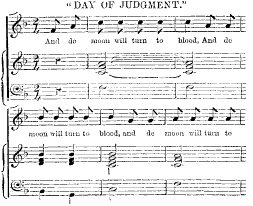
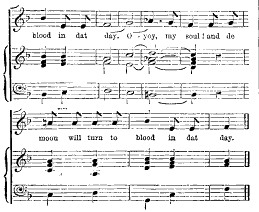
"DAY OF JUDGMENT"
And de moon will turn to blood,
And de moon will turn to blood,
and de moon will turn to blood in dat day.
O- yoy my soul,
and de moon will turn to blood in dat day.
2. And you'll see de stars a fallin'.
3. And de world will be on fire.
4. And you'll hear de Saints a singin'.
5. And de Lord will say to de sheep.
6. For to go to Him right hand.
7. But de goats muss go to de left.
8. 0 Lord, make me a sheep.
9. When de Jordan shall be past.
10. Den Canaan's light shall shine.
The "O-yoy," at the end of the third repetition of each line is sung as a sort of prolonged wail number of voices dwelling on the notes to which it is set, must be very thrilling.
The words and most of the similies are borrowed from Scripture, and the frequency of certain allusion, offer a very good key towards determining which parts of Scripture are and the effect of most favoured by these people, or best known to them. The
book of Revelation supplies a good number the descriptions or prophecies of the Last day, the new Jerusalem, or the glories of "the other side of Jordan," found in the writing of the Prophets, or in the Gospels or Epistles form the theme of many songs; these, with many class expressions peculiar to the several religious bodies who have from time to time undertaken the task of teaching the coloured people, indicate not only the prevalent influence at work at the time they were written, or rather "raised," but also the portions; of Scripture usually dwelt upon, or considered applicable.
One of the most favoured of the negro custom, the "shout," at which most of these songs are sung is thus, described in the New York Nation of May 30, 1867:
"the true 'shout' takes place on Sunday, or on 'praise' night through the week, and either in the praise house or in some cabin in which a regular meeting has been held. Very likely more than half the population of the plantation is gathered together. Let it be the evening, and a light wood fire burns red before the door of the house and on the hearth. For some time one can hear, though at a good distance, the vociferous exhortation of the presiding elder or of the brother who has the glft that way, and who is not, 'on the back seat,' or under the censure of the church athorities for bad behaviour, and at regular intervals one hears the elder 'deaconing' a hymn-book hymn, which is sung two lines at a time, and whose wailing cadences, borne on the
night air, are indescribably melancholy.
But the benches are pushed back to the wall when the formal meeting is over and old and young, men and women, sprucely dressed young men grotesquely half clad field hands-the women generally with gay handkerchiefs wrapped about their heads, and with short skirts- boys wlth tattered shirts and mens' trousers- young girls, barefooted, all stand up in the middle of the floor, and when the 'sperichil' is struck up, begin first walking, and by-and-bye shuffling round, one after the other in a ring. The foot is hardly taken from the floor, and the progression is mainly due to a jerking, hitching motion, which agitates the entire shouter. Sometimes they dance silently. Sometimes as they shuffle they sing the chorus of the 'sperichil' and sometimes the song itself is also sung by the dancer. But more frequently a band, composed of some of the best singers and of tried shouters stand at the side of the room to 'base' the others, singing the body of the song, and clapping their hands upon their knees." [my italics]
Song and dance are alike extremely energetic, and often, when the shout lasts into the middle of the night, the monotonous thud thud, of the feet, prevents sleep within half-a-mile of the praise house." Almost of these 'sperichils" have rhythmical tunes well adapted for dancing to, and the solemn gravity with which this function is performed in the belief that the more energetic "get religion," is incomprehensible to those whose religious ceremonies are quiet and orderly. It is easy to imagine how the wavering and flagging might be excited by such words and melody as-
"NOT WEARY YET"
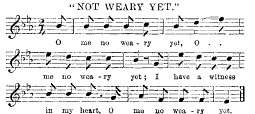
O me no wea- ry yet,
O, O me no wea - ry yet;
I have a witness in my heart,
O me no wea - ry yet.
There are dozens of other tunes of equally original and quaint character, sung and accepted as hymns by the Negro population of America; and if the line which divides the sublime from the ridiculous is more present to our eyes than to those of the people among whom they are accepted yet they are none the less valuable as expressions of the life and character of that people. The wild, sad strains tell, as the sufferers themselves would of crushed hopes, keen sorrow, and a dull daily misery, whieh covered them as hopelessly as the fog from the rice swamps. On the other hand, the words breathe a trusting faith in rest for the future in 'Canaan's (f)air and happy land' to which their eyes seem constantly turned.
W. A. BARTETT Mus. Bac.